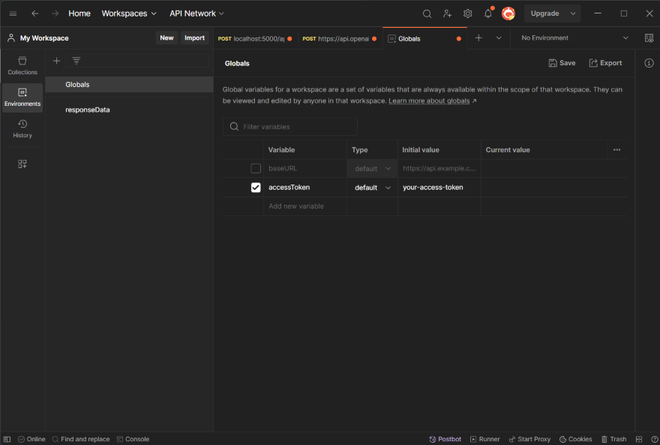How to dynamically manage data using variables in Postman?
Last Updated :
03 Jan, 2024
In this article, we will learn dynamic data management in Postman through the use of variables. Postman, a substantially used API trying out and improvement device, gives a sturdy framework for growing, organizing, and executing API requests. Variables, as key components of Postman’s capability, permit customers to inject flexibility, reusability, and adaptability into their workflows.
Process of dynamically managing data using variables in Postman
Variables in Postman:
Variables in Postman function placeholders for dynamic statistics that can be reused for the duration of requests. They decorate flexibility, reusability, and maintainability in API testing and development. Variables in Postman can be defined at different levels: Global, Environment, and Local.
These are described at the global degree and persist at some point of all requests within Postman. They are beneficial for storing constants or records shared across various API calls.
Steps to dynamically manage data using variables in Postman:
- Click on the “Environments” in the left sidebar.
- Click “Globals” to select a global environment.
- Add variables with their values. For example:
- Variable: baseURL, Value: https://api.example.com
- Variable: accessToken, Value: your-access-token

Global Variable in Postman
Environment Variables:
Scoped to a selected surroundings, those variables permit you to manipulate sets of values for one-of-a-type testing or deployment situations. Environments can be switched without issues, converting the values of variables because of this. Follow the same steps as for global variables, but set variables specific to a particular environment.
Scoped to a particular request or script, nearby variables are useful for storing brief facts or calculations interior a specific API name.
Set variables within a specific request or script.
- In the request, click on the “Pre-request Script” tab.
- Add a script like: pm.variables.set(“localVariable”, “value”);

Variable in Postman
Accessing Variables:
Variables are accessed the usage of the {{variableName}} syntax. This lets in for dynamic substitution of values in the path of the execution of a request.
Dynamic Data in Requests:
URLs: Variables can be used in URLs to create dynamic endpoints or include parameters.
GET {{baseURL}}/users/{{userId}}
Headers: Variables are used to set dynamic values in headers.
Authorization: Bearer {{accessToken}}
Request Body: Use variables in the request body for dynamic data.
{
"username": "{{username}}",
"password": "{{password}}"
}
Scripting:
Pre-request Scripts: Scripts written in JavaScript may be used to dynamically generate or alter variables in advance than a request is sent. This allows for advanced customization primarily based on situations or calculations.
Javascript
pm.environment.set("timestamp", new Date().toISOString());
|
Chaining Requests:
- Variables facilitate the chaining of requests through permitting information extracted from one response for use in subsequent requests.
- Use the response of one request as input for another.
- Access response data using pm.response.json() or pm.response.text() and set it to a variable for future use.
Javascript
var jsonData = pm.response.json();
pm.environment.set("userId", jsonData.id);
|
Dynamic Test Data:
- Variables are instrumental in generating dynamic test data, aiding in the creation of diverse scenarios during testing.
- Use variables in test scripts to create dynamic test data.
Javascript
var dynamicValue = "Test_" + Math.floor(Math.random() * 1000);
pm.environment.set("dynamicData", dynamicValue);
|
Collections and Workflows:
Variables can be applied at the collection level, allowing for centralized management. This is especially useful when organizing requests into logical groups or workflows.
Data Files:
Postman helps using CSV or JSON data files to store and manipulate sets of information. Variables can reference these external documents, permitting the testing of a couple of scenarios with exclusive input values.
Automation:
Integration with CI/CD pipelines allows for the automation of testing workflows. Variables play a crucial role in adapting requests to various environments during automated testing.
Conclusion
By following these steps, you can efficiently use variables in Postman to create dynamic and flexible requests, making your testing and development workflows more robust and adaptable to different scenarios.
Share your thoughts in the comments
Please Login to comment...